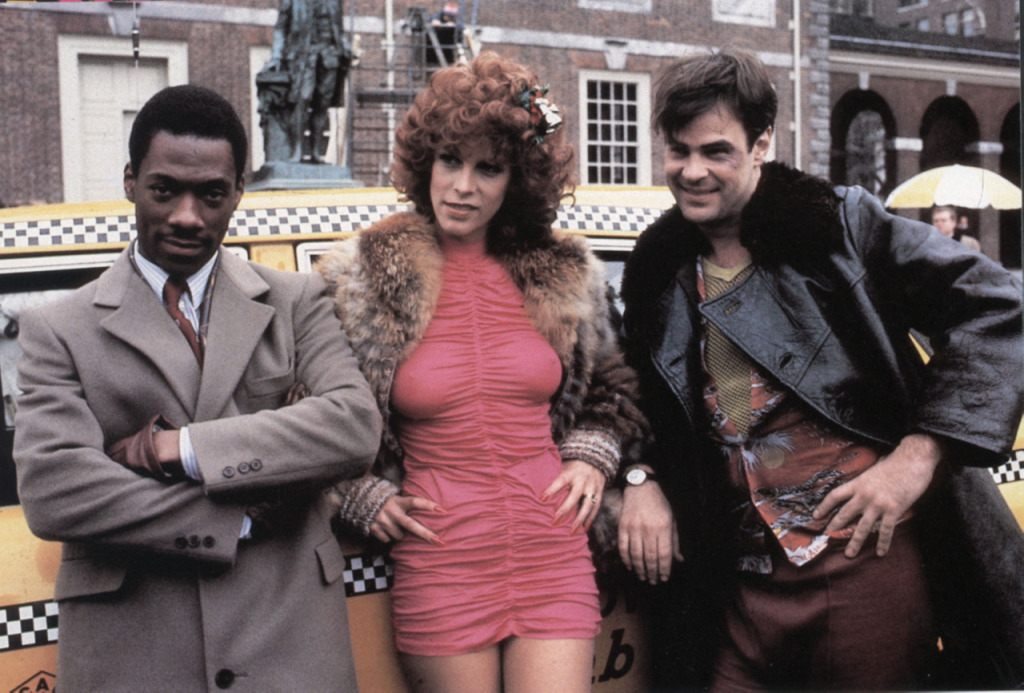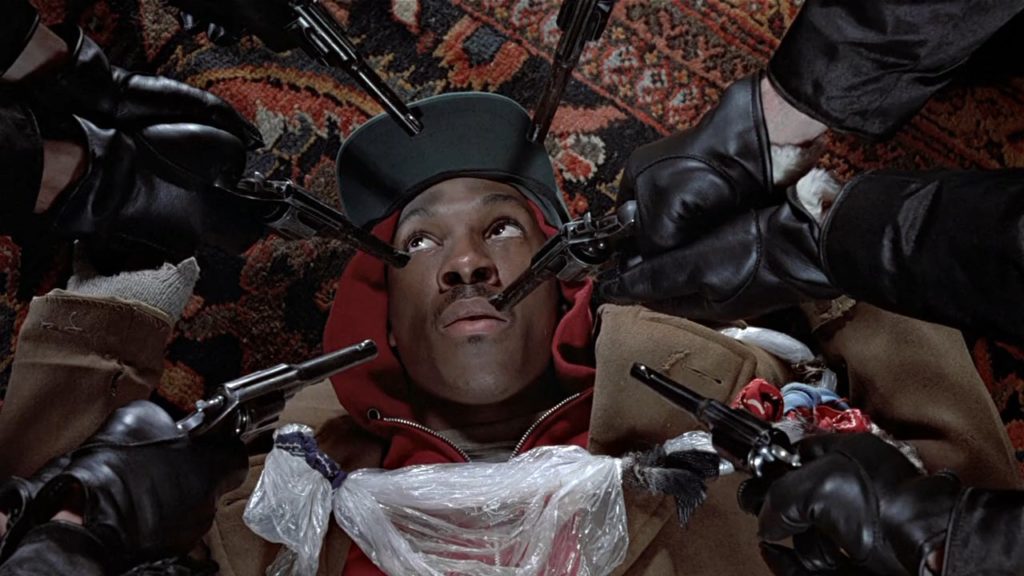Chestnuts on an open fire. Mistletoe above the doorway. Pepper spray at the local Walmart. Yes, the holidays are finally upon us, so it’s time to break out all those sentimentally delightful songs and movies that bring cheered spirits, glad tidings and…boobs? Yeah, sometimes boobs. After all, those are the earmarks of a really good holiday movie. The ones that percolate just above the surface of the badass that is Jimmy Stewart and his Wonderful Life. The outliers. This (bi)weekly-ish column aims to have your holiday goose gander at Christmas movies that some might consider inappropriate, but always manage to light some holiday cheer.
Trading Places
Ah, the 80s. Back when Reaganomics was king. Back when Frankie said Relax. Back when Eddie Murphy was still funny. From this milieu spawned Trading Places, a holiday film that is surprisingly as relevant now as it was back in 1983. Director John Landis brings his trademark biting humor together with the masterstroke pairing of SNL alums Dan Aykroyd and Eddie Murphy to tell the story of Louis Winthrope (Aykroyd), managing director of the brokeridge Duke and Duke, and Billy Ray Valentine (Murphy), a conman who could hustle his way out of any situation. The Duke brothers and Winthrope are big, crazy money. They operate in the upper echelons of high society; the one percent of the one percent. Winthrope’s mornings consist of getting served breakfast, checking the pork belly market, and being dressed before having a chauffeur take him to work.
Valentine by comparison squeezes his way into a wood push-cart that makes him look legless and begs for money in a nearby park. He hustles to one woman in particular, “Once you have a man with no legs you never go back.” It’s this dichotomy that creates the spine of Trading Places and when Valentine is fingered for stealing Wintrope’s briefcase despite his innocence, the fuse is lit for the Duke brothers to place a nasty wager between one another- betting that Valentine could do just as good a job as Winthrope despite being the product of a “bad environment”.
The Dukes bail Valentine out of jail and explain to him that they are giving him a job, in the spirit of the holiday season, you see. Valentine questions their motivations, but is not one to look a gift horse in the mouth (when offered a cigar in the back of their limo, he takes seven with one grab of his finger-less gloved hands). Valentine’s acclimation to the high life is not without its wrinkles. Upon bathing in a Jacuzzi, he delightedly exclaims, “When I was growing up and we wanted a Jacuzzi we had to fart in the tub!” No better line of dialogue in the movie sums up this transitional period for Valentine than the delicately placed, “Motherfucker? Moi?” to a brutish looking drunk in a seedy bar where Valentine proceeds to make it rain with hundred dollar bills.
But Valentine is quick to make the transition, unlike Winthrope, who is not faring so well, thrown in jail after being framed by the Dukes for embezzling money. His fiancée is nonplussed about his current state despite his manic recounting (“Those men wanted to have sex with me!”) and she quickly dumps him after a prostitute named Ophelia (Jamie Lee Curtis)is paid to act like the two have a past. With his home occupied and all banking accounts frozen, he has no choice but to stay with Ophelia in a poverty stricken neighborhood while he tries to figure out just what is going on.
With places roundly traded, Buddy sets into his new role nicely, using his hustler experience and street smarts to predict the market to great success, so much so that it makes the papers. When Winthrope reads who has usurped his old life, he goes on the offensive, “Christmas huh? I’ll give him a Christmas gift he’ll never forget!” But on that fateful night in which Winthrope dresses as Santa at the Duke and Duke Christmas party, there to sabotage Buddy’s career, Valentine instead becomes privy to the Dukes’ bet and plans to team up with Winthrope to put together the ultimate Christmas gift, served best cold.
Trading Places is startlingly relevant today and not just because of the season. The Dukes’ bet ends up being a great big fat metaphor for how the one percent have always been the invisible puppet masters of the American economic system, causing it to expand and contract to suit their every whim. Also eerily poignant is the noticeable absence of the middle class in the movie, which has been disappearing from the American class system for years.
Trading Places is not a movie about the haves and have-nots. It’s not about learning to appreciate what you have. It’s about understanding that people are people, regardless of class or income bracket. It’s the idea that while someone might not have a car, or a perfect home, they most likely have a bigger heart than you and don’t quickly take for granted the smaller details in life. It celebrates the themes of those classic Christmas tales like It’s A Wonderful Life and A Christmas Carol; that true wealth is something that can’t be counted or bought or sold and that richness of character will always outweigh the richness material posession.


